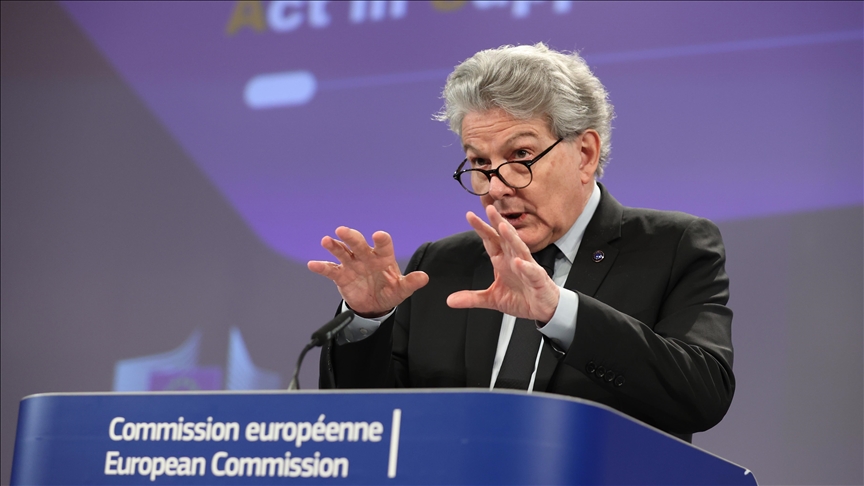EU lawmakers to vote on world’s first law regulating artificial intelligence
Agnes Szucs |13.06.2023

European Union Commissioner for Internal Market Thierry Breton holds a press conference on EU plan to accelerate ammunition production in Brussels, Belgium on May 03, 2023.
( Dursun Aydemir - Anadolu Agency )
BRUSSELS
The European Union wants tech companies to put a watermark on contents generated by artificial intelligence, EU Commissioner for Internal Market Thierry Breton said on Tuesday.
“We need to label anything that is AI-generated by tagging them with watermarks,” Breton said at a European Parliament debate on AI systems in Strasbourg, France.
“It is essential to build confidence for providers and consumers” and to ensure transparency in the case of generative AI systems, such as ChatGPT, he added.
Breton also said the EU is “gradually phasing in a new world order” by working on the world’s first legislation on AI.
For her part, EU Commissioner for Competition Margrethe Vestager underlined that the new EU legislation would not hamper technological innovation.
Instead, democracy will be “shaping how we use technology in the best interest of the human being,” she asserted.
Once adopted, the legislation will ensure that AI is used in a “safe, transparent and non-discriminatory way,” explained Italian EU lawmaker Brando Benifei, the file’s rapporteur.
On the initiative of the European Parliament, the law would strictly ban systems based on manipulative techniques, social profiling, and most forms of biometric surveillance.
The full parliament will vote on a law on Wednesday to adopt the negotiating mandate that will guide European Parliament representatives during talks with EU member states and the European Commission.
The law is expected to enter into force in 2026 at the earliest.
BRUSSELS
The European Union wants tech companies to put a watermark on contents generated by artificial intelligence, EU Commissioner for Internal Market Thierry Breton said on Tuesday.
“We need to label anything that is AI-generated by tagging them with watermarks,” Breton said at a European Parliament debate on AI systems in Strasbourg, France.
“It is essential to build confidence for providers and consumers” and to ensure transparency in the case of generative AI systems, such as ChatGPT, he added.
Breton also said the EU is “gradually phasing in a new world order” by working on the world’s first legislation on AI.
For her part, EU Commissioner for Competition Margrethe Vestager underlined that the new EU legislation would not hamper technological innovation.
Instead, democracy will be “shaping how we use technology in the best interest of the human being,” she asserted.
Once adopted, the legislation will ensure that AI is used in a “safe, transparent and non-discriminatory way,” explained Italian EU lawmaker Brando Benifei, the file’s rapporteur.
On the initiative of the European Parliament, the law would strictly ban systems based on manipulative techniques, social profiling, and most forms of biometric surveillance.
The full parliament will vote on a law on Wednesday to adopt the negotiating mandate that will guide European Parliament representatives during talks with EU member states and the European Commission.
The law is expected to enter into force in 2026 at the earliest.
No comments:
Post a Comment